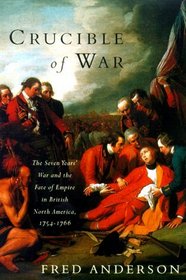Search -
Crucible of War : The Seven Years' War and the Fate of Empire in British North America, 1754-1766
Crucible of War The Seven Years' War and the Fate of Empire in British North America 17541766
Author:
In this engrossing narrative of the great military conflagration of the mid-eighteenth century, Fred Anderson transports us into the maelstrom of international rivalries. With the Seven Years' War, Great Britain decisively eliminated French power north of the Caribbean — and in the process destroyed an American diplomatic system in which N... more »
Author:
In this engrossing narrative of the great military conflagration of the mid-eighteenth century, Fred Anderson transports us into the maelstrom of international rivalries. With the Seven Years' War, Great Britain decisively eliminated French power north of the Caribbean — and in the process destroyed an American diplomatic system in which N... more »
ISBN-13: 9780375406423
ISBN-10: 0375406425
Publication Date: 2/15/2000
Pages: 912
Rating: 1
ISBN-10: 0375406425
Publication Date: 2/15/2000
Pages: 912
Rating: 1
3 stars, based on 1 rating
Publisher: Knopf
Book Type: Hardcover
Other Versions: Paperback, Audio CD
Members Wishing: 1
Reviews: Amazon | Write a Review
Book Type: Hardcover
Other Versions: Paperback, Audio CD
Members Wishing: 1
Reviews: Amazon | Write a Review
Genres:
- History >> Americas >> United States >> Colonial Period >> General
- History >> Americas >> United States >> Colonial Period >> French and Indian War
- History >> Europe >> England >> General
- History >> Europe >> England >> 18th Century
- History >> Europe >> France >> General
- History >> World >> 18th Century




